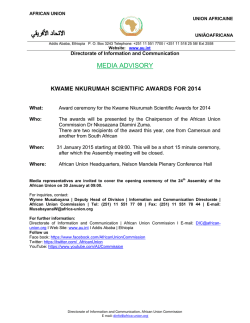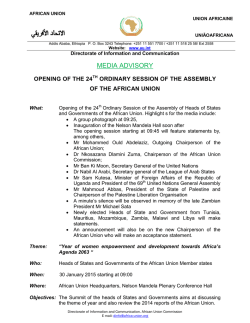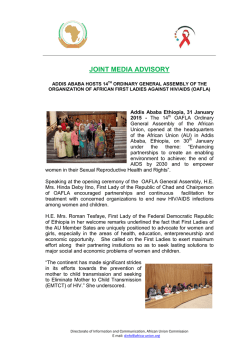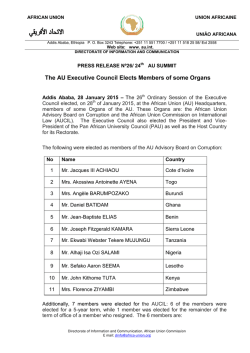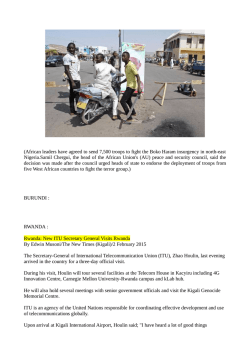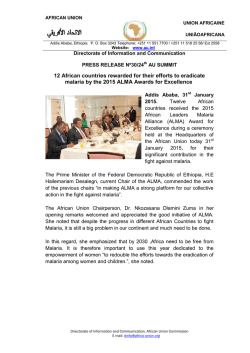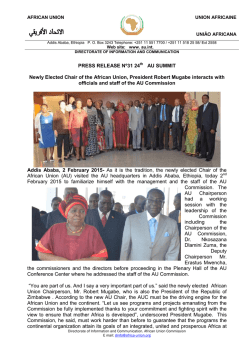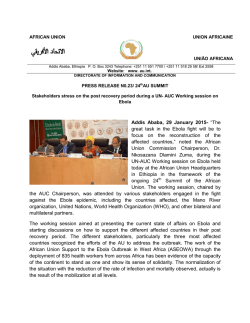
10TH MEETING OF THE AFRICAN UNION – UNITED NATIONS
10TH MEETING OF THE AFRICAN UNION – UNITED NATIONS JOINT TASK FORCE ON PEACE AND SECURITY ADDIS ABABA, 1 FEBRUARY 2015 JOINT COMMUNIQUÉ 1. On 1 February 2015, the United Nations (UN) – African Union (AU) Joint Task Force (JTF) on Peace and Security held its 10th consultative meeting at the AU Headquarters in Addis Ababa, Ethiopia, on the margins of the 24th Ordinary Session of the Assembly of the Union. The AU Commission and the UN Secretariat were represented respectively by Commissioners Smail Chergui (Peace and Security) and Aisha Abdullahi (Political Affairs) and the Under-Secretaries-General Jeffrey Feltman (Political Affairs), Hervé Ladsous (Peacekeeping Operations), and Haile Menkerios, UN Office to the AU. They were accompanied by other senior officials from the two organizations. 2. The JTF discussed issues of common interest and identified areas of collaboration in a number of countries, including in the Democratic Republic of the Congo (DRC), Libya, Mali and the Sahel, South Sudan, Sudan and Central African Republic (CAR), and the efforts to address the threat posed by the Boko Haram terrorist group. The meeting also discussed forthcoming elections in Africa and agreed on how to coordinate UN-AU actions in support of regional and national efforts to ensure the holding of smooth, credible elections that contribute to the consolidation of peace and security. Furthermore, the JTF agreed to continue to cooperate in the area of peacekeeping based on the principles of shared responsibility, value addition and complementarity. In that regard, the meeting welcomed the ongoing UN review of peace operations and progress in the operationalization of the African Standby Force (ASF) and the African Capacity for Immediate Response to Crises (ACIRC). 3. South Sudan: The JTF expressed its serious concern at the prevailing situation in South Sudan. It urged the parties to demonstrate the necessary commitment to end the bloodshed in their country and respond to the aspirations of their people. The JTF reiterated its support to the mediation-led IGAD-led mediation and to the efforts of UNMISS on the ground and called on the South Sudanese government and other stakeholders to extend all the necessary cooperation to the Mission. It took note of the decision of the AU Peace and Security Council (PSC) to establish a High-Level ad hoc Committee to enhance support to the IGAD mediation. The AU and the UN agreed to work together in support of the ad hoc Committee once it is operationalized. The JTF noted the decision of the PSC on 29 January 2015, to defer consideration of the report of the AU Commission of Inquiry on South Sudan (AUCISS) to a later date. The JTF reiterated that accountability for human rights violations and other abuses committed in the course of the conflict, healing and reconciliation among all South Sudanese communities will be critical for reaching a sustainable peace in South Sudan. 2 4. Sudan: The JTF stressed the importance of the successful, transparent and inclusive implementation of the National Dialogue Initiative announced by the Sudanese authorities in January 2014. It called on the Sudanese stakeholders to demonstrate the political will, create the required conditions on the ground and extend all the necessary cooperation to the AUHIP. The JTF exchanged views on the ongoing efforts by the AUHIP, with the support of the UN and other international partners, to achieve ceasefires in the Two Areas and in Darfur, with a view to paving the way for the participation of the armed movements in the envisaged National Dialogue. The JTF welcomed the continuing close cooperation between the AUHIP and the UN Special Envoy, and looked forward to their continued coordinated efforts in support of comprehensive and lasting solution to the multidimensional challenges facing the Sudan within the context of the National Dialogue. In addition, the meeting expressed alarm about the ongoing hostilities in some parts of Darfur and the Two Areas their devastating consequences on civilians. It urged the Government of Sudan and the rebels to immediately cease hostilities and facilitate humanitarian access. 5. Libya: The JTF expressed its concern at the prevailing security and humanitarian situation in Libya, as well as at the continued political impasse in the country, with far reaching implications for Libya itself and the neighbourhood. It reiterated that only inclusive political dialogue would bring about lasting peace, security, stability and reconciliation. In this regard, the JTF expressed full support to the on-going UN-led mediation efforts and welcomed the outcome of the first round of the UN facilitated dialogue held in Geneva, from 14 to 15 January 2015, as well as the convening, since 26 January 2015, of the second round of the dialogue. The JTF also welcomed the efforts of the countries of the region, including the initiative by Algeria to convene a reconciliation conference bringing together all Libyan stakeholders, building on the outcomes of the Geneva process. The JTF welcomed the establishment of the International Contact Group for Libya (ICG-L), and the convening of two meetings to-date under joint AU-UN chairmanship. The AU and the UN agreed to work together to enhance the ICG-L, in line with the conclusions of its 28 January 2015 meeting, as well as to identify practical ways through which the AU can further contribute to the UN-led Mediation and assist in putting in place a ceasefire monitoring mechanism in Libya. 6. DRC and the Great Lakes Region: The JTF stressed the need to redouble efforts towards the effective implementation of the Peace, Security and Cooperation (PSC) Framework for the DRC and the Great Lakes Region. In that respect, the JTF welcomed the announcement made by the DRC Government to launch operations against the FDLR and looked forward to the urgent military and other measures to be taken by the DRC Government and MONUSCO to neutralize the FDLR, following the refusal of this group voluntarily to disarm within the timeline stipulated by the Security Council, the AU and countries of the region. The JTF urged all actors concerned to speed up the implementation of the Nairobi Declarations that concluded the Kampala Dialogue between the DRC Government and the M23. It welcomed the outcome of the first meeting of the PSC Framework Guarantors convened by the AU and the UN in Addis Ababa, on 2 December 2014, and encouraged the regular holding of such meetings. The JTF welcomed the close cooperation between the Special Envoys on the Great Lakes Region, and encouraged them to pursue their efforts and coordination. The JTF welcomed the outcome of the 5th meeting of the PSC Framework Regional Oversight Mechanism, held in Addis Ababa on 31 January 2015, and agreed to work together towards the 3 implementation of the decisions adopted. 7. Mali & Sahel: The JTF expressed deep concern at the prevailing security situation in Northern Mali and recent tension on the ground. The JTF called on all parties to respect their ceasefire commitments by halting military operations and resolving any issues through the established implementation mechanisms. It reiterated its full support to MINUSMA, and called on all stakeholders in Mali to extend the necessary cooperation with the Mission to enable it to effectively carry out its mandate as set by the Security Council, particularly its efforts to support the implementation of the ceasefire. The JTF took note of the conclusions of the Niamey meeting of MINUSMA’s African countries troop contributors, held on 5 November 2014, as well as of the pronouncement of the matter made by the Summit of the member countries of the Nouakchott Process on the further enhancement of security cooperation and operationalization of APSA in the Sahelo-Saharan region, held on 18 December 2014. The AU Commission and the UN Secretariat agreed to work together to identify ways and means of further enhancing MINUSMA. The AU informed the UN of its plans to convene a meeting in Bamako, in early March 2015, to follow up on the recommendations made by countries of the region regarding the enhancement of MINUSMA. The JTF reiterated its support to the Algiers Process, and urged the Malian parties to demonstrate their good faith and make the compromises necessary to quickly conclude a comprehensive agreement with clearly defined implementation arrangements, on the basis of the document prepared by the Algerian-led Mediation and the principles of the respect of the unity and territorial integrity of Mali, as well as the secular nature of the State. 8. The JTF reiterated the importance of the Bamako Ministerial Platform for the Sahel. The AU and UN, which provide the joint secretariat for the Platform, agreed to undertake consultations with Mali, as Chair, to enhance the effectiveness of this forum and its contribution to a coordinated implementation of the various Strategies on the Sahel. Furthermore, the JTF welcomed the convening of the Summit of the Nouakchott Process member states. The AU Commission and the UN Secretariat agreed to work together towards the implementation of the relevant provisions of the Nouakchott Declaration, in particular with respect to the planned meetings on joint patrols and mixed units. The AU welcomed the UN readiness to provide the necessary support towards the finalization of the related concept of operations and other documents. 9. Boko Haram: The JTF expressed its support to the efforts of the member states of the Lake Chad Basin Commission (LCBC) and Benin, in particular the establishment of the Multinational Joint Task Force (MNJTF), to combat the Boko Haram terrorist group, as well as the Regional Intelligence Fusion Unit. The JTF expressed concern at the humanitarian impact of the Boko Haram activities, in particular the displacement of populations in the affected areas and towards neighboring countries. It agreed to work together closely in the finalization of the MNJTF CONOPS and other related documents, in line with the conclusions of the Niamey ministerial meeting of 20 January 2015, as well as the Security Council presidential statement and the PSC communique of 19 and 29 January 2015, respectively, and in accordance with the UN Human Rights Due Diligence Policy. The JTF underlined the need for a multi-dimensional response to the Boko Haram threat that, in addition to the military and security operations against Boko Haram and other terrorist groups, would include other measures aimed at facilitating the return of displaced populations and improving livelihoods, education and job creation, as well as protection 4 of human rights. The JTF agreed to identify other practical ways of effectively supporting the efforts of the countries of the region, notably the operationalization of the MNJTF. 10. Central African Republic: The JTF noted the need for enhanced coordination and a unified approach among all stakeholders to promote peace in CAR in line with the outcomes of the conclusions of the 6th meeting of the ICG-CAR. The JTF called on all stakeholders to continue to lend support to the political process in the CAR, including the ongoing local consultation process and the Bangui Forum meeting, and the upcoming elections. They agreed to continue supporting jointly, including in the framework of the G8-RCA, efforts of all parties towards the implementation of the Brazzaville Agreement as well as the ongoing local consultation process and the Bangui Forum meeting 11. Lessons learned in transitions from AU to UN operations: The meeting welcomed the findings and recommendations of the Secretary-General’s Letter to the UN Security Council on lessons learned in transitions from AU peace operations to UN peacekeeping operations in Mali and CAR It further welcomed the spirit of cooperation between the UN and the AU in this process. The JTF agreed to develop jointly a transition toolbox to ensure a more coherent framework for AU to UN transitions and guide future transition processes. It also agreed jointly to conduct a lesson learned exercise to identify contextspecific benchmarks that could be used to determine the conditions under which a transition should take place, given the needs in the country and the situation on the ground, as well as to review and provide an assessment of the various mechanisms available to improve the predictability, sustainability and flexibility of financing AU peace operations authorized by the Security Council. 12. The JTF took note of the increasingly challenging realities facing UN peace operations, particularly asymmetric threats, transnational organized crime and an increasing trend of targeted attacks against peacekeepers, as well as stalled peace processes which have the potential to undo the hard-won gains made over the past years. In this regard, the JTF looked forward to the comprehensive review on peace operations that is being undertaken by the UN appointed High Level Panel chaired by former President Jose Ramos Horta and to the consultations with the AU, scheduled to take place in Addis Ababa from 9 to 13 February 2015. 13. ASF/ACIRC: The JTF welcomed the progress achieved to date towards the operationalization of the African Standby Force (ASF) and welcomed the full operational capability reached by the East African Standby Force Coordinating Mechanism (EASFCOM) in November 2014. The JTF also welcomed the steps taken towards the operationalization of the African Capacity for Immediate Response to Crises (ACIRC) and the ongoing process of harmonization of both concepts. The JTF encouraged all concerned to take the necessary steps to ensure that full operational capability for the ASF is achieved by 2015. It called for sustained and focused international support. It therefore agreed to work towards the successful holding of the Amani Africa II Field Training Exercise in South Africa in the course of 2015 and other related activities as well as intensify strategic and institutional engagement towards enhanced coordinated support. 5 14. Elections: The JTF reviewed the upcoming elections in Africa scheduled for the period 2015/16. The JTF observed that a considerable number of African countries are holding critical national and sub-national elections, as well as constitutional referenda. The JTF noted the polarized political environment in which some of these elections are likely to take place, including debates on term limits and inclusiveness. The JTF took note of the high risk for election-related violence, and consequently emphasized the need for joint and/or coordinated analysis and assessment of pre-election situations to provide the basis for coordinated preventive diplomacy initiatives by the two organizations in order to ensure that these elections contribute to the advancement of democracy, as well as to the promotion of lasting peace and security. It acknowledged that a good basis for cooperation already exists in the various initiatives currently being undertaken by the AU, Regional Economic Communities/Regional Mechanisms, and the UN. The JTF stresses the importance of the African Charter on Democracy, Elections and Governance. 15. Follow-up: The JTF requested the relevant AU Commission and UN Secretariat Departments and offices to ensure follow-up on the conclusions of the meeting, including drawing up, within two weeks, an implementation plan with specific timelines. It agreed to convene regular meetings on the implementation of the agreed decisions as appropriate.
© Copyright 2026
